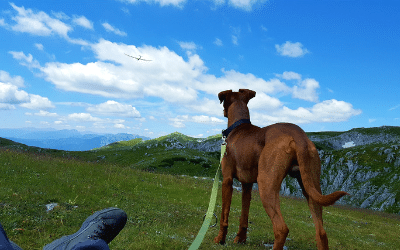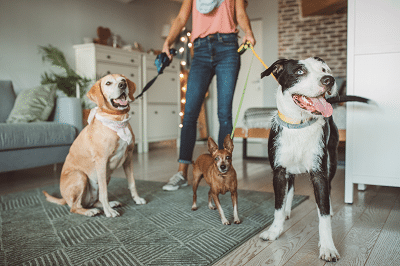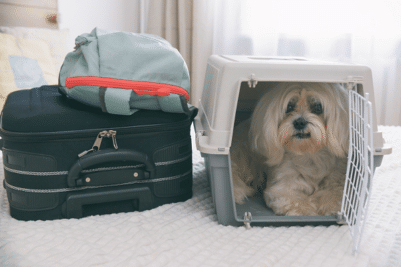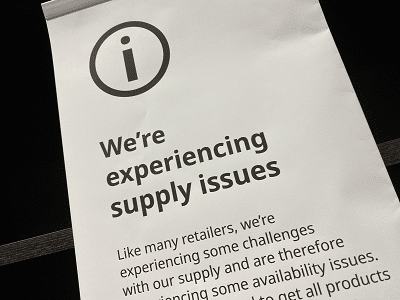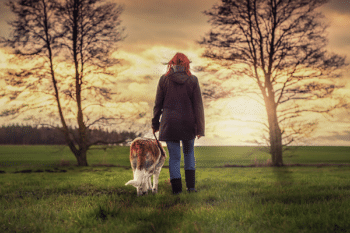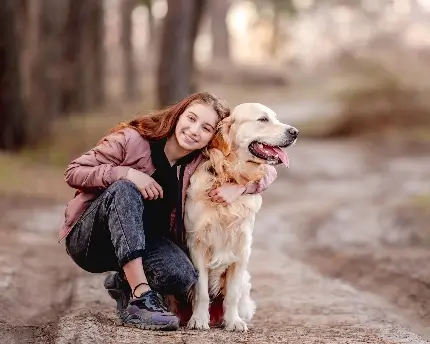Nothing beats a long-awaited summer vacation.
From long, leisurely hikes in the mountains, to romping on the beach, or camping under the stars, these are all great experiences you can have with your pup.
Preparing ahead of time will ensure that both you and your dog will enjoy a summer vacation. But while planning your holiday, you may decide that sending your dog on his own “vacation” (boarding kennel), or staying with a pet sitter, might actually be a better option for both of you.
If you do decide to take your dog with you, here are some factors to consider BEFORE you head on your summer vacation:
- Is your destination pet-friendly? Are you travelling to a big city where noise and commotion might be upsetting and out of the ordinary for your dog? Check to see if there are parks nearby, so you can exercise your dog. Practice walking your dog in busy areas of your town or city to allow your dog to become comfortable with the noise. Practice “hard-surface” elimination in case there are few grassy areas for your dog to relieve himself.
- Is the hotel you are staying in pet-friendly? Many hotels have rooms designated for pets. When booking the hotel room, make sure to indicate that you have a dog (or two). Often there is a small fee per night added to your bill. Usually, pets are not to be left alone in the room, but exceptions may apply if your dog is crated. Be sure to check with the hotel, as each hotel has different policies.
- Are you camping, or renting a cottage? Do not assume that the cottage is pet-friendly and do not try to sneak your dog in (cottage neighbors may report you and you may find yourself without accommodation). Be sure to check with the cottage owners to ensure your dog is welcome. Many campgrounds allow pets, with specific rules regarding leashing, dogs left alone on site, and where exercise and elimination are allowed. Again, be sure to check with the campground before arriving. Being turned away at the end of a long day’s drive is not the way to start your vacation!
- How will you get to your vacation spot? Will you be travelling by car, plane, or train? If you are travelling by car, consider where you will stop for bathroom breaks. Plan out bathroom breaks at rest stops or welcome centers. Stopping at the side of the freeway is dangerous for both you and your dog! Planning where you will stop every couple of hours along the way, will prevent emergency stops. If you plan on travelling by plane or train, check with the airline or train carrier to find out the specific regulations for travelling.
- Does your dog suffer from motion sickness or car stress? Many dogs will salivate excessively and vomit while on road trips. Reducing the stress of being in the car before you head out on your vacation is well worth the time commitment. Train your dog to like car rides by spending time in the car, playing and exploring. Be sure to give treats. Gradually increase the time spent in the car, start the car, turn on the air conditioning, and eventually introduce short drives – first around the block and then increase the length of the drive. It may take some time for your dog to become accustomed to the car, but it sure beats your dog vomiting each time you drive somewhere! See your veterinarian for other options if your dog continues to become sick in the car.
- Have you packed everything you will need? Some essential items include: food, water, food and water dishes, treats, leashes, proof of ownership, vaccination records, identification tags, toys, comb/brush, bed, crate, towels, medications (including flea, tick, and heartworm preventives), waste bags, and travel water containers for hikes. Do not forget to pack your dog’s toothbrush and toothpaste.
- Will you be in extreme heat or humidity? Your dog may be accustomed to the heat, but not to the humidity. Some dogs may not be used to the heat at all. Don’t plan big hikes or a lot of outdoor activity until your dog has acclimated to the new climate. Make sure to have lots of water on hand at all times, as dogs can become dehydrated quickly in extreme heat and humidity.
- Will you be hiking and/or hiking in the mountains? Bring along a collapsible water bowl or dog water bottle (be sure your dog is comfortable drinking from the dog water bottle before your trip) and carry lots of water with you. If you are hiking in the mountains, take it slow and allow your dog (and you) to stop every 20-30 minutes for a water break. It is easy to get dehydrated if you or your dog are not used to higher elevations.
- Be aware of parasites at your destination. While heartworm, tick-borne diseases, and fleas may not be a concern in your hometown, they might be at your destination. Your veterinarian can provide you with information on what parasites are present at your destination and provide you with any preventives that your dog needs.
- Ensure your dog is properly identified. Losing your dog would ruin your vacation. Make sure your dog is microchipped before you head out on your vacation. Verify that the contact information associated with the chip is up-to-date. Consider buying an ID collar for your dog which includes your cell phone number.
- Are you crossing state/line or going to another country? If so, check to see if you need a health certificate. This is a government document signed by your veterinarian indicating that your dog is free from communicable disease and that your vaccinations are up-to-date.
- Finally, consider if you (and your dog) will enjoy your vacation. A vacation is only fun if everyone is having a good time. If you plan on going out a lot and will be leaving your dog in your camper or hotel room, that may not be fun for your dog. If you think that the activities you will do on your vacation will be unsuitable for your dog, have him stay at home with a pet sitter, or send him to “camp” at a kennel with other furry friends.
Family vacations are all about having fun and making memories, for people and pets included!
LifeLearn News
Note: This article, written by LifeLearn Animal Health (LifeLearn Inc.) is licensed to this practice for the personal use of our clients. Any copying, printing or further distribution is prohibited without the express written permission of Lifelearn. Please note that the news information presented here is NOT a substitute for a proper consultation and/or clinical examination of your pet by a veterinarian.

